Peer-Reviewed Articles by Jessica X Zu
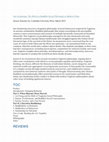
Just Awakening uncovers a forgotten philosophy of social democracy inspired by Yogācāra, an ancie... more Just Awakening uncovers a forgotten philosophy of social democracy inspired by Yogācāra, an ancient, nondualistic Buddhist philosophy that claims everything in the perceptible cosmos is mere consciousness and consists of multiple karmically connected yet bounded lifeworlds. This Yogācāra social philosophy emerged in the late nineteenth and early twentieth centuries among Chinese intellectuals who struggled against the violent Social Darwinist logic of the survival of the fittest. Its proponents were convinced that the root cause of crisis in both China and the West was epistemic-an unexamined faith in one common, objective world and a subject-object divide. This dualistic paradigm, in their view, had dire consequences, including moral egoism, competition for material wealth, and racial war. Yogācāra insights about plurality, interdependence, and intersubjectivity, however, had the capacity to awaken the world from these deadly dreams.

International Journal of Asian Studies, 2021
The current study reveals that the Buddhist egalitarian spiritual message found global resonance ... more The current study reveals that the Buddhist egalitarian spiritual message found global resonance in an era of globalized inequality. By comparing three modern retellings of an ancient romance between an outcaste (untouchable/Dalit) maiden and the Buddha's attendant Ānanda, this study showcases a shared sociospiritual horizon that emerged in the Indian and Chinese Buddhist revivals and that thwarted colonial epistemic domination and offered powerful social critiques. More specifically, this study shows that the Indian and Chinese afterlives of the romance display innovative formations of Buddhist social consciousness. The authors reinterpreted equality and freedom on Buddhist terms, creating a new standard of civilization. Employing this "already democratic" Buddhist civilization, they launched critiques of the Indian caste system and Chinese patriarchy. This socio-spiritual horizon subverts the typecast images of "spiritual India" and "rational China." Whereas these images reflect the limits of the comparative lens based on political regimesnamely, Indian democracy and Chinese socialismthe current study goes beyond regime types by examining diverse formations of universal religion in the cultural sphere. More broadly, a critical strategy for provincializing Europe is to block the colonial gaze and instead showcase the vibrant cultural productions and meaning-making that circulated at the margins of empire.
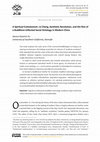
Journal of Global Buddhism, 2021
This study examines the early career of the renowned Buddhologist Lü Cheng as an aspiring revolut... more This study examines the early career of the renowned Buddhologist Lü Cheng as an aspiring revolutionary. My findings reveal that Lü's rhetoric of "aesthetic revolution" both catapulted him into the center of the New Culture Movement and popularized a Buddhist idealism-Yogācāra (consciousness-only school)-among thinkers who sought alternatives social theories. Lü aimed to refute social Darwinism and scientific materialism, which portray humans as mechanized individuals bereft of moral agency. He theorized an antirealist social ontology, i.e., a social oneness grounded in intersubjective resonances, from which subjective interiority and objective exteriority arise. Lü turned to Buddhism to further his revolution. Buddhist soteriology supplied powerful tools for theorizing the social: The doctrine of no-self refuted philosophical solipsism and curtailed individualism; dependent-origination refashioned social evolution as collective spiritual progress. Lü's spiritual-evolutionism-cum-socialontology broadens the field of Buddhist philosophy that has a long-standing blind spot on social philosophies developed in the Global South.
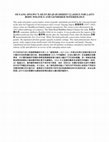
Journal of Chinese Religions, 2019
This study articulates a prescriptive vision of gender and family put forth by the renowned leade... more This study articulates a prescriptive vision of gender and family put forth by the renowned leader of the laity-led Yogācāra (Consciousness-only) revival, Ouyang Jingwu 歐陽竟無 (1837–1943), whose vision of a Buddhicized family remains unexplored. This vision is best illustrated in his 1931 edited anthology of scriptures, The Must-Read Buddhist (Inner) Classics for Laity 在家必讀內典, sometimes dubbed a Buddhist bible by its readers. It was produced at the request of the Buddhist politician Dai Jitao 戴季陶 shortly after the Nationalist Party elder Hu Hanmin 胡漢民 masterminded the New Civil Code. While Dai held politically conservative beliefs about gender, Hu stipulated absolute gender equality in family settings. This study demonstrates that to garner wider support from intellectuals with diverging views on gender and family, Ouyang refashioned ancient Indian gender anxiety into disciplinary techniques intended to marshal the entirety of life and afterlives in service of the emerging nation-state.
Conference Presentations by Jessica X Zu
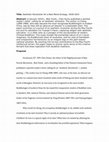
AAR Annual Conference, 2018
In January 1919’s New Youth, Chen Duxiu published a spirited reader’s letter, calling for an aest... more In January 1919’s New Youth, Chen Duxiu published a spirited reader’s letter, calling for an aesthetic revolution. The author Lü Cheng (1896-1989), who later became the most recognized Buddhologist of modern China, was by then still an obscure art teacher in a backwater town. This paper examines Lü’s pursuit of an aesthetic revolution during the May Fourth era and his refutation Cai Yuanpei’s thesis—replacing religion with aesthetic education. Lü is often seen as a paragon of the secularization of modern Chinese Buddhism. This study reveals the enchanted nature of Lü’s social imaginary, his Buddhicized vision of revolution, and his view of translation and comparative hermeneutics as an integral step on the path toward national salvation. By zooming into his key contributions to the May Fourth intellectual terrain, this paper hopes to recover some sense of this creative ferment that drew inspiration from Buddhist traditions.

Critical thinking is a buzz term in contemporary academia. However, it is often used to demarcate... more Critical thinking is a buzz term in contemporary academia. However, it is often used to demarcate what one is NOT doing rather than explain what academic study is about. Such contention is not new. Indeed, it resembles many debates among Chinese intellectuals in the early twentieth century when critical thinking became a popular strategy to denigrate one's enemy.
Here, I present a unique approach that defines critical thinking (Chinese: pipan jingshen) as the Buddhist logic grounded in compassion. By tracing the genealogies of this term, I investigate the politics of translation and the role of Chinese Buddhist scholasticism in the colonial circuit of knowledge production about Buddhism.
Catalyzed by the challenge of comparative philology and the influx of Sanskrit texts which put Chinese translations into question, Lü Cheng (1896-1989), a forgotten leader of modern Buddhist revival, offered a new solution of a Buddhist internal problematic by refashioning two key Buddhist teachings-logic (Sanskrit: Hetuvidya; Chinese: yinming) and compassion into a clear articulation of what critical thinking is.
For Lü, this critical thinking promises to avoid subjective impositions of meaning onto ancient texts. Hence, it provides an alternative understanding of the scientific method NOT premised upon an objective world outside consciousness but grounded on an impersonal and systematic soteriology of abandoning ego. In so doing, Lü deftly undercut the privileges formerly enjoyed by modern European Buddhologists, suggesting that their critical thinking falls short due the lack of empathy towards the interpretative communities who had made the Indic texts available to modern readers.

Abstract: In 1931, Ven. Yinguang 印光added a fifth book—“The Chapter of Mahāsthāmaprāpta’s Perfect ... more Abstract: In 1931, Ven. Yinguang 印光added a fifth book—“The Chapter of Mahāsthāmaprāpta’s Perfect Interconnectivity of Summoning Amitābha” (the 24th Chapter of Perfect Interconnectivity) from The Śūraṅgama Sūtra into the Pure Land Canon. In 1932, Guo Taidi 郭泰棣, the owner of Shuang Bailu Zhai雙百鹿齋—a publishing house famous for its high quality prints of scriptures, funded the first mass printing of The Five Books of Pure Land 淨土五經. The popularity of this new Pure Land canon can be testified by its frequent reprinting, the posthumous attribution of Ven. Yinguang as the 13th patriarch of the Pure Land sect, and the ensuing legend depicting him as the emanation of Mahāsthāmaprāpta.
This paper argues that the success of The Five Books lies crucially in Yinguang’s overarching project of refashioning Bodhisattva Spirit as a poor men’s philanthropy. Instead of merely advertising what one can gain from praying to Amitābha, the poor men’s philanthropy empowers its practitioners by highlighting what one can do daily for a country beleaguered by Western intrusions and for a world besieged by social vices brought by modernity. As such, the poor men’s philanthropy powerfully reverts the narrative of the white men’s burden and calls upon Buddhist practitioners to transform their sufferings into impetus and resources for renewing the world through one’s pious daily practices.
By contextualizing the making of The Five Books in Yinguang’s lifetime’s work such as collating temple gazetteers, recensioning Essential Resources For the Pure Land Practitioners, epistolary writings, organizing Dharma Assemblies for Releasing Life, etc., this paper traces the trajectory of Yinguang’s refashioning of Bodhisattva Spirits as a cure to the vices of modernity and hopes to draw our attention to the modern spirit inherent in the “traditionalist” camp of Republican Buddhists.
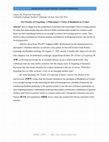
Abstract: How to engage with the proliferation of machines and technologies? This is a vexing que... more Abstract: How to engage with the proliferation of machines and technologies? This is a vexing question for many East Asian intellectuals who strived to build a national polity suitable for a modern world. Many resorted to glorifying traditions as a strategy to reinvent the founding myth of a nation. Thus, similar to their contemporary European thinkers, remembrance of things past became a key feature in becoming modern.
However, Inoue Enryo 井上円了 begged to differ. Widely known by his contemporaries as a philosopher, a Buddhist reformer, an educator, and a patriot, he was well versed in both Western knowledge and Buddhist teachings. On August 11, 1895, merely 4 months after Japan won the first Sino-Japanese war, he published a seemingly insignificant booklet The Technê of Forgetting 失念術, celebrating this technê for its essential efficacy in one’s achievement in life. This celebratory tone not only starkly contrasts with the elegiac tenor of forgetting in European discourses but also seems untimely for a nation immersed in the joy of victory. What does forgetting have to offer, in Inoue’s view, to an emerging modern state?
By contextualizing The Technê of Forgetting in Inoue’s oeuvre The Studies of the Supranormal 妖怪学, I argue that this booklet epitomizes his paradigm of Buddhism-as-Technê: a two-pronged strategy of both subsuming the flood of technologies into a Buddhist framework and refashioning Buddhist philosophy as the spiritual technê to cure the vices of Western materialism. As such, forgetting promises a spiritualized modernity that enables a harmonious cohabitation of Japanese tradition with Western machine culture in a modern nation-state. Through key reformers such as Cai Yuanpei 蔡元培 and Liang Qichao 梁啟超, Inoue’s vision also mediated the Chinese experience of the machine.
The affective turn in cultural theories happened soon after Hardt and Negri's theorization of "af... more The affective turn in cultural theories happened soon after Hardt and Negri's theorization of "affective labor" as a capitalist production. Derailing Spinoza's project of confining affective power in the natural order, affective labor redirected our gaze from the psychoanalytical and biological to the social dimension of affect. In this affective turn, scholars soon began to distinguish affect from emotion, articulating various processes of how a subject captures and qualifies affect into socially scripted emotions and relegating affective labor into the realm of emotion.

Memories do not exist. Rather, they happen. They happen in “that fluid space where the subjective... more Memories do not exist. Rather, they happen. They happen in “that fluid space where the subjective experience and historical events intermingle” (Eubanks). This panel explores the particular ways that memories happen in the Chinese context and seeks to illuminate both the richness of Chinese theorization of remembrance and the heterogeneity of “Chinese memory.” How does the Chinese (lack-of)-subject of memory challenge European theories that put the agency of memory squarely in the individual? Can we break out the impasse of belles infidèles—beautiful because faithless (to the original) or faithful only if unattractive (to readers) by interpreting translation as a creative process of remembrance? How does memory happen in different ways when it is performed and when it is narrated? By engaging with these questions, this panel enriches our understanding of both remembrance of China’s past and critical theory by bringing them into a generative encounter.
Paper 1: The Subject of Memory: The Self in Tao’an Dream Reminiscences (陶庵梦忆) –Shuchen Xiang
Paper 2: Storytelling and Recollecting Self: Stan Lai's A Dream Like a Dream—Wei-Chih Wang
Paper 3: Buddhist ‘Structures of Feeling’ in the Modernist ‘Peking Opera’—The Matanga Girl—Xiaomin Zu
Paper 4: Translation as Memory: Wang Jiaxin’s Paul Celan—Lea Pao

Many scholars of Confucianism have long discredited the idea that human rights are incompatible w... more Many scholars of Confucianism have long discredited the idea that human rights are incompatible with Asian values because of their supposed emphasis on the social, communal or relational self. Yet, many of them also acknowledge that significant philosophical reformulations are needed to incorporate the individualistic concept of human rights into Asian thoughts and practices.
My paper examines the philosophies of two prominent May-Fourth thinkers, Lü Cheng (1896-1989) and Xiong Shili (1885-1968) and shows how their thinking on personhood and individuality may be useful for and relevant to our understanding of human rights. Through an in-depth reading of their 1943 debate, my paper critically engages with both thinkers’ metaphysical ideas and arguments on human agency and human value, which provide the philosophical foundation for their socio-political quest of transforming the people into spiritually aware and politically active citizens of a new nation. Lü formulates human moral agency by harking back to the “authentic Buddha’s teaching” — xingji (primal purity) which is a restatement of dependent-origination. Xiong invents a holographic human value based on Tathagatagarbha doctrine —xingjue (original enlightenment) — and the Neo-Confucian idea of tiyong bu’er (non-duality of substance and function). Their ideas of human agency and human value are based on a conception of personhood that reciprocally integrates sociality and autonomy, potentially, if not directly, addressing the tension between Chinese collectivism and Western individualism.
In the process of their philosophical pondering on the nature of being human, they offer clear hints of how such metaphysically driven conceptions of humanity may serve as the philosophical anchor of an alternative and viable human rights discourse. From our contemporary vantage point, my paper looks at their ideas as intellectual resources that may complement and critique the dominant Western assumptions about human rights discourse, and contemplates how this discourse may become a global ethics.
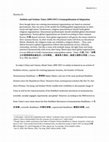
" While Taixu (1890-1947)is widely known as the founder of Humanitarian Buddhism in China today, ... more " While Taixu (1890-1947)is widely known as the founder of Humanitarian Buddhism in China today, by examining Taixu’s cosmopolitan thought and practices, this paper demonstrates that Taixu’s cosmopolitanism is also a fundamental element in his Humanitarian Buddhism—a form of contingent cosmopolitanism that emerged through the struggle to both resist the secular nationalists’ dismissal of Buddhism as superstition and to participate in the anti-colonialism and anti-Japanese imperialism movements.
In this sense, Taixu’s cosmopolitan thought and practices anticipated Robbins’s neologism of cosmopolitics because Taixu skillfully employed both universalistic cosmopolitan ideals and patriotic sentiments that captured the popular imagination at appropriate time. As a result, his cosmopolitics and his vision of a larger Buddhist community beyond national boundaries not only helped to build up a national Buddhist community beyond sectarian divides but also established a sense of multi-national Buddhist solidarity in China and Indo-China countries at a space-time of mind-boggling confusions, pieties, and urgencies.
"
Dissertation by Jessica X Zu
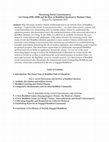
Why did many modern Chinese intellectuals turn to an extreme form of Buddhist idealism—Yogācāra (... more Why did many modern Chinese intellectuals turn to an extreme form of Buddhist idealism—Yogācāra (the school of consciousness-only)— at a time when science, realism, and social Darwinism were dominating early twentieth-century China? To understand this apparent paradox, this dissertation traces the intellectual journey of the renowned advocate of Buddhist idealism, Lü Cheng. In the 1920s, Lü called for an aesthetic revolution. He soon turned to consciousness-only philosophy as the prime resource for renewing society. This study reveals that Buddhist idealism appealed to many modern Chinese intellectuals for its powerful social critique. Consciousness-only doctrines proved effective in counterbalancing scientific materialism, remedying the ills of modern capitalism, and redefining social evolution as spiritual progress. This dissertation argues that Lü’s philosophy repurposed Buddhist spiritual exercises to build an egalitarian, democratic society. Lü was one of the most interesting figures trying to reorient the Buddhist path of liberation for social reform. His endeavor reveals to us that, to understand the social transformation of modern China, we must take seriously the Buddhist vision for societal renewal. Lü’s theorization of Buddhist social consciousness also illuminates the transnational trend of integrating Buddhism and activism, which later contributed to the rise of engaged Buddhism.
Teaching Documents by Jessica X Zu
Buddhist Literature and engaged Buddhism
Syllabi for Buddhist Literature and engaged Buddhism
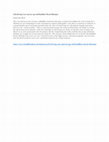
Buddhistdoor Global, 2019
This essay discusses the relevance of Buddhist emotional education, as depicted in Jataka tales s... more This essay discusses the relevance of Buddhist emotional education, as depicted in Jataka tales such as King Sivi’s dilemma, for our technological world. Contemporary analytic philosophers, who often see emotions as obstacles to consequentialist moral reasoning, typically frame the ethics of self-driving cars through the thought experiment known as the “trolley problem.” This is a misconception because the trolley problem allows the thinker to assume the safe position of an onlooker, while the technology of self-driving cars denies us this false sense of safety and thrusts us as active participants into the moment, thereby transforming the trolley problem into an age-old karmic dilemma, for example the scenario faced by King Sivi. The relevance of the Jataka tales lies in the fact that Buddhist karmic thinking trains one to see one’s emotions as part of the bigger picture, and many pragmatic exercises have been devised to properly rewire one’s emotional responses for a larger purpose.
https://www.buddhistdoor.net/features/self-driving-cars-and-an-age-old-buddhist-moral-dilemma
Invited Talks by Jessica X Zu
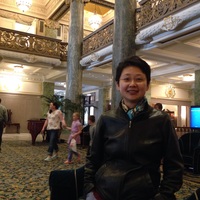
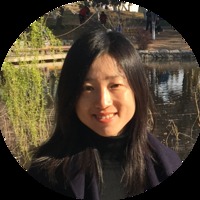


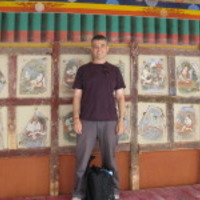
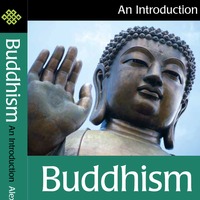



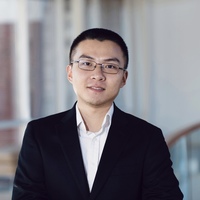

Uploads
Peer-Reviewed Articles by Jessica X Zu
Conference Presentations by Jessica X Zu
Here, I present a unique approach that defines critical thinking (Chinese: pipan jingshen) as the Buddhist logic grounded in compassion. By tracing the genealogies of this term, I investigate the politics of translation and the role of Chinese Buddhist scholasticism in the colonial circuit of knowledge production about Buddhism.
Catalyzed by the challenge of comparative philology and the influx of Sanskrit texts which put Chinese translations into question, Lü Cheng (1896-1989), a forgotten leader of modern Buddhist revival, offered a new solution of a Buddhist internal problematic by refashioning two key Buddhist teachings-logic (Sanskrit: Hetuvidya; Chinese: yinming) and compassion into a clear articulation of what critical thinking is.
For Lü, this critical thinking promises to avoid subjective impositions of meaning onto ancient texts. Hence, it provides an alternative understanding of the scientific method NOT premised upon an objective world outside consciousness but grounded on an impersonal and systematic soteriology of abandoning ego. In so doing, Lü deftly undercut the privileges formerly enjoyed by modern European Buddhologists, suggesting that their critical thinking falls short due the lack of empathy towards the interpretative communities who had made the Indic texts available to modern readers.
This paper argues that the success of The Five Books lies crucially in Yinguang’s overarching project of refashioning Bodhisattva Spirit as a poor men’s philanthropy. Instead of merely advertising what one can gain from praying to Amitābha, the poor men’s philanthropy empowers its practitioners by highlighting what one can do daily for a country beleaguered by Western intrusions and for a world besieged by social vices brought by modernity. As such, the poor men’s philanthropy powerfully reverts the narrative of the white men’s burden and calls upon Buddhist practitioners to transform their sufferings into impetus and resources for renewing the world through one’s pious daily practices.
By contextualizing the making of The Five Books in Yinguang’s lifetime’s work such as collating temple gazetteers, recensioning Essential Resources For the Pure Land Practitioners, epistolary writings, organizing Dharma Assemblies for Releasing Life, etc., this paper traces the trajectory of Yinguang’s refashioning of Bodhisattva Spirits as a cure to the vices of modernity and hopes to draw our attention to the modern spirit inherent in the “traditionalist” camp of Republican Buddhists.
However, Inoue Enryo 井上円了 begged to differ. Widely known by his contemporaries as a philosopher, a Buddhist reformer, an educator, and a patriot, he was well versed in both Western knowledge and Buddhist teachings. On August 11, 1895, merely 4 months after Japan won the first Sino-Japanese war, he published a seemingly insignificant booklet The Technê of Forgetting 失念術, celebrating this technê for its essential efficacy in one’s achievement in life. This celebratory tone not only starkly contrasts with the elegiac tenor of forgetting in European discourses but also seems untimely for a nation immersed in the joy of victory. What does forgetting have to offer, in Inoue’s view, to an emerging modern state?
By contextualizing The Technê of Forgetting in Inoue’s oeuvre The Studies of the Supranormal 妖怪学, I argue that this booklet epitomizes his paradigm of Buddhism-as-Technê: a two-pronged strategy of both subsuming the flood of technologies into a Buddhist framework and refashioning Buddhist philosophy as the spiritual technê to cure the vices of Western materialism. As such, forgetting promises a spiritualized modernity that enables a harmonious cohabitation of Japanese tradition with Western machine culture in a modern nation-state. Through key reformers such as Cai Yuanpei 蔡元培 and Liang Qichao 梁啟超, Inoue’s vision also mediated the Chinese experience of the machine.
Paper 1: The Subject of Memory: The Self in Tao’an Dream Reminiscences (陶庵梦忆) –Shuchen Xiang
Paper 2: Storytelling and Recollecting Self: Stan Lai's A Dream Like a Dream—Wei-Chih Wang
Paper 3: Buddhist ‘Structures of Feeling’ in the Modernist ‘Peking Opera’—The Matanga Girl—Xiaomin Zu
Paper 4: Translation as Memory: Wang Jiaxin’s Paul Celan—Lea Pao
My paper examines the philosophies of two prominent May-Fourth thinkers, Lü Cheng (1896-1989) and Xiong Shili (1885-1968) and shows how their thinking on personhood and individuality may be useful for and relevant to our understanding of human rights. Through an in-depth reading of their 1943 debate, my paper critically engages with both thinkers’ metaphysical ideas and arguments on human agency and human value, which provide the philosophical foundation for their socio-political quest of transforming the people into spiritually aware and politically active citizens of a new nation. Lü formulates human moral agency by harking back to the “authentic Buddha’s teaching” — xingji (primal purity) which is a restatement of dependent-origination. Xiong invents a holographic human value based on Tathagatagarbha doctrine —xingjue (original enlightenment) — and the Neo-Confucian idea of tiyong bu’er (non-duality of substance and function). Their ideas of human agency and human value are based on a conception of personhood that reciprocally integrates sociality and autonomy, potentially, if not directly, addressing the tension between Chinese collectivism and Western individualism.
In the process of their philosophical pondering on the nature of being human, they offer clear hints of how such metaphysically driven conceptions of humanity may serve as the philosophical anchor of an alternative and viable human rights discourse. From our contemporary vantage point, my paper looks at their ideas as intellectual resources that may complement and critique the dominant Western assumptions about human rights discourse, and contemplates how this discourse may become a global ethics.
In this sense, Taixu’s cosmopolitan thought and practices anticipated Robbins’s neologism of cosmopolitics because Taixu skillfully employed both universalistic cosmopolitan ideals and patriotic sentiments that captured the popular imagination at appropriate time. As a result, his cosmopolitics and his vision of a larger Buddhist community beyond national boundaries not only helped to build up a national Buddhist community beyond sectarian divides but also established a sense of multi-national Buddhist solidarity in China and Indo-China countries at a space-time of mind-boggling confusions, pieties, and urgencies.
"
Dissertation by Jessica X Zu
Teaching Documents by Jessica X Zu
https://www.buddhistdoor.net/features/self-driving-cars-and-an-age-old-buddhist-moral-dilemma
Invited Talks by Jessica X Zu
Here, I present a unique approach that defines critical thinking (Chinese: pipan jingshen) as the Buddhist logic grounded in compassion. By tracing the genealogies of this term, I investigate the politics of translation and the role of Chinese Buddhist scholasticism in the colonial circuit of knowledge production about Buddhism.
Catalyzed by the challenge of comparative philology and the influx of Sanskrit texts which put Chinese translations into question, Lü Cheng (1896-1989), a forgotten leader of modern Buddhist revival, offered a new solution of a Buddhist internal problematic by refashioning two key Buddhist teachings-logic (Sanskrit: Hetuvidya; Chinese: yinming) and compassion into a clear articulation of what critical thinking is.
For Lü, this critical thinking promises to avoid subjective impositions of meaning onto ancient texts. Hence, it provides an alternative understanding of the scientific method NOT premised upon an objective world outside consciousness but grounded on an impersonal and systematic soteriology of abandoning ego. In so doing, Lü deftly undercut the privileges formerly enjoyed by modern European Buddhologists, suggesting that their critical thinking falls short due the lack of empathy towards the interpretative communities who had made the Indic texts available to modern readers.
This paper argues that the success of The Five Books lies crucially in Yinguang’s overarching project of refashioning Bodhisattva Spirit as a poor men’s philanthropy. Instead of merely advertising what one can gain from praying to Amitābha, the poor men’s philanthropy empowers its practitioners by highlighting what one can do daily for a country beleaguered by Western intrusions and for a world besieged by social vices brought by modernity. As such, the poor men’s philanthropy powerfully reverts the narrative of the white men’s burden and calls upon Buddhist practitioners to transform their sufferings into impetus and resources for renewing the world through one’s pious daily practices.
By contextualizing the making of The Five Books in Yinguang’s lifetime’s work such as collating temple gazetteers, recensioning Essential Resources For the Pure Land Practitioners, epistolary writings, organizing Dharma Assemblies for Releasing Life, etc., this paper traces the trajectory of Yinguang’s refashioning of Bodhisattva Spirits as a cure to the vices of modernity and hopes to draw our attention to the modern spirit inherent in the “traditionalist” camp of Republican Buddhists.
However, Inoue Enryo 井上円了 begged to differ. Widely known by his contemporaries as a philosopher, a Buddhist reformer, an educator, and a patriot, he was well versed in both Western knowledge and Buddhist teachings. On August 11, 1895, merely 4 months after Japan won the first Sino-Japanese war, he published a seemingly insignificant booklet The Technê of Forgetting 失念術, celebrating this technê for its essential efficacy in one’s achievement in life. This celebratory tone not only starkly contrasts with the elegiac tenor of forgetting in European discourses but also seems untimely for a nation immersed in the joy of victory. What does forgetting have to offer, in Inoue’s view, to an emerging modern state?
By contextualizing The Technê of Forgetting in Inoue’s oeuvre The Studies of the Supranormal 妖怪学, I argue that this booklet epitomizes his paradigm of Buddhism-as-Technê: a two-pronged strategy of both subsuming the flood of technologies into a Buddhist framework and refashioning Buddhist philosophy as the spiritual technê to cure the vices of Western materialism. As such, forgetting promises a spiritualized modernity that enables a harmonious cohabitation of Japanese tradition with Western machine culture in a modern nation-state. Through key reformers such as Cai Yuanpei 蔡元培 and Liang Qichao 梁啟超, Inoue’s vision also mediated the Chinese experience of the machine.
Paper 1: The Subject of Memory: The Self in Tao’an Dream Reminiscences (陶庵梦忆) –Shuchen Xiang
Paper 2: Storytelling and Recollecting Self: Stan Lai's A Dream Like a Dream—Wei-Chih Wang
Paper 3: Buddhist ‘Structures of Feeling’ in the Modernist ‘Peking Opera’—The Matanga Girl—Xiaomin Zu
Paper 4: Translation as Memory: Wang Jiaxin’s Paul Celan—Lea Pao
My paper examines the philosophies of two prominent May-Fourth thinkers, Lü Cheng (1896-1989) and Xiong Shili (1885-1968) and shows how their thinking on personhood and individuality may be useful for and relevant to our understanding of human rights. Through an in-depth reading of their 1943 debate, my paper critically engages with both thinkers’ metaphysical ideas and arguments on human agency and human value, which provide the philosophical foundation for their socio-political quest of transforming the people into spiritually aware and politically active citizens of a new nation. Lü formulates human moral agency by harking back to the “authentic Buddha’s teaching” — xingji (primal purity) which is a restatement of dependent-origination. Xiong invents a holographic human value based on Tathagatagarbha doctrine —xingjue (original enlightenment) — and the Neo-Confucian idea of tiyong bu’er (non-duality of substance and function). Their ideas of human agency and human value are based on a conception of personhood that reciprocally integrates sociality and autonomy, potentially, if not directly, addressing the tension between Chinese collectivism and Western individualism.
In the process of their philosophical pondering on the nature of being human, they offer clear hints of how such metaphysically driven conceptions of humanity may serve as the philosophical anchor of an alternative and viable human rights discourse. From our contemporary vantage point, my paper looks at their ideas as intellectual resources that may complement and critique the dominant Western assumptions about human rights discourse, and contemplates how this discourse may become a global ethics.
In this sense, Taixu’s cosmopolitan thought and practices anticipated Robbins’s neologism of cosmopolitics because Taixu skillfully employed both universalistic cosmopolitan ideals and patriotic sentiments that captured the popular imagination at appropriate time. As a result, his cosmopolitics and his vision of a larger Buddhist community beyond national boundaries not only helped to build up a national Buddhist community beyond sectarian divides but also established a sense of multi-national Buddhist solidarity in China and Indo-China countries at a space-time of mind-boggling confusions, pieties, and urgencies.
"
https://www.buddhistdoor.net/features/self-driving-cars-and-an-age-old-buddhist-moral-dilemma